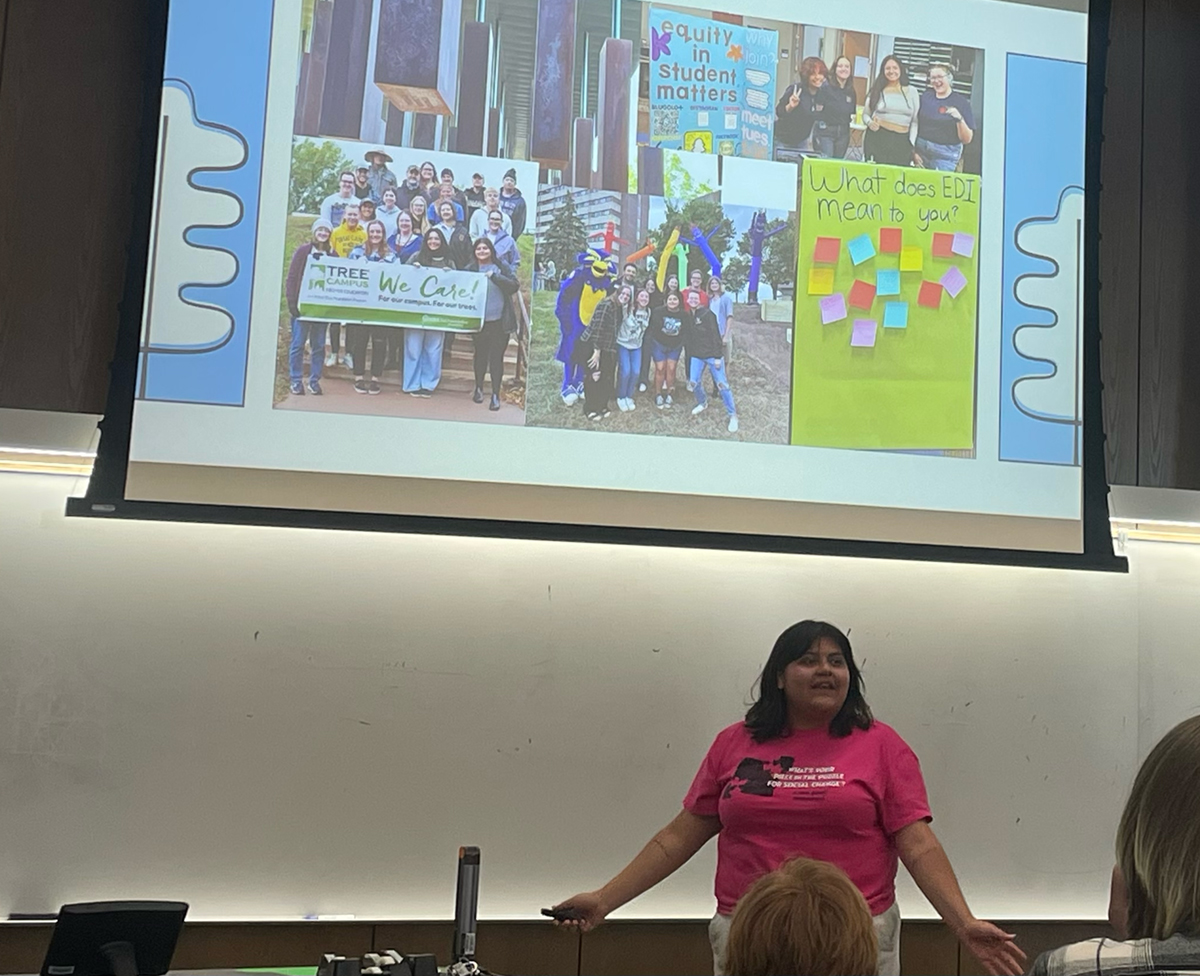On April 25, the Equity in Student Matters Commission (ESM) hosted a forum to discuss equity, diversity and inclusion (EDI). Over fifty people met at Centennial Hall to hear from faculty and students about the importance of EDI, legislation and threats to EDI programs.
“Diversity because no two students are the same, Inclusivity because nobody should be left out and equity because different students need different things to succeed. These are principles that are fundamental to all education and all educators,” Peter Hart-Brinson said.
Hart-Brinson is a professor in the departments of sociology and communication/journalism at UW-Eau Claire and president of the UW-Eau Claire Faculty Union.
Over the past several years, Hart-Brinson said, politicians across the nation have been meddling in education with particular emphasis on targeting EDI programs.
Hart-Brinson pointed out that since 2023, 84 bills have been introduced in 28 states including the elimination of EDI offices, the banning of diversity statements and outlawing mandatory EDI training. 12 such bills in 10 states have been signed into law.
After a failure in Wisconsin to pass four bills of this kind, Hart-Brinson said, the Joint Committee on Employment Relations (JOCER) refused to give all University of Wisconsin employees the pay raises voted on because of EDI offices on university campuses.
“They held employee pay raises hostage in an attempt to extract concessions through backroom deals when they couldn’t get it done in the light of day,” Hart-Brinson said.
As a result, Hart-Brinson said, UW-Systems President Jay Rothman chose to comply with those attempts and negotiate with JOCER.
“In December, the Board of Regents paid the ransom. They chose to remove valuable EDI positions and sold out our core values to free up the hard-earned wages that they had no right to withhold in the first place,” Hart-Brinson said.
Hart-Brinson said the goal of the forum was to have an open dialogue between students and professors about the issues at hand.
Gloria Howerton, geography and anthropology professor and Intersectional Women’s Center president, spoke about historical patterns in EDI opposition, comparable modern case studies and where the nation is headed in the context of EDI.
“The contemporary EDI moral panic is not new,” Howerton said. “Schools are sites of political contestation, where decisions about our national values come out. It’s not surprising that these sites so often come under attack by various political entities.”
Howerton traced the history of EDI issues back to the 1930s, when groups were formed as push-back against New Deal reforms. She said these groups helped solidify a rhetoric linking reforms in areas such as labor or anti-racism to communism.
“They essentially argued that the true American identity is individualistic and that we should not be pushing for protections for groups based on things like race, class, gender, etc.,” Howerton said.
This carried on into the 1950s and ‘60s via organizations like the John Birch Society, which Howerton said opposed the governmental implementation of civil rights laws and further exacerbated the idea that EDI strides were backed by communist agendas.
“We see an approach to education born from this system of thought that wants to actively undermine accommodation of cultural difference,” Howerton said. “The overall goal of these various groups is to instill a specific type of national identity within the school system.”
Howerton said today, money is a primary tool used to discourage and eliminate EDI programs. She cited a 2010 lawsuit in Arizona, when a Tuscan school’s Mexican American Studies Program was removed by way of cutting funding.
“The way they made this happen is a key thing that relates back to Wisconsin,” Howerton said. “Something you’re going to see again and again through a lot of this legislation is that use of money.”
Howerton said the Arizona case has served as a framework for other states, leading to copycat legislation in the years following. She highlighted examples of this occurring in other states, adding that even schools following EDI program guidelines are receiving this backlash.
Professor Pamela Forman, Sociology Department chair and co-coordinator of the Family Studies Program, spoke to EDI issues surrounding transgender rights and accommodations.
“The moral panics happening around transgender exclusivity are also nothing new, but the level at which they’ve exacerbated in the past few years is a tremendous degree,” Forman said.
Forman said this year alone, 24 bills have passed that are anti-transgender rights. 19 of those bills have become law and there are 378 such bills pending across the nation. 145 have failed. Amongst the 145, four failed bills have been in Wisconsin.
“When we’re talking about these anti-transgender bills, there are a number of fronts,” Forman said.
She said these fronts include issues like bathrooms, sports, access to education, healthcare and civil rights. Forman added that UW-Eau Claire has made strides in areas like access, housing and counseling and health services, but that the campus still has a ways to go.
“The word diversity matters. We need it and don’t have enough of it,” Forman said. “But in the end, it’s equity and inclusivity that are really going to affect who will be drawn to the university and wants to stay here. Equity saves lives. We need to fight.
Maddie Blong, president of the Inter-Tribal Student Council, discussed EDI from a student perspective.
“The importance of EDI for students on campus is very clear and likely something we can all agree on,” Blong said. “We can incorporate EDI through different communities on campus that support students of color, members of LGBTQ+ and others who may need special support.”
Blong gave examples of organizations that help her feel supported on campus as a student of color, including the Multicultural Student Services office and the Inter-Tribal Student Council.
“Having a community here that I know will support me through my journey with cultural identity is really important and fundamental for keeping me here,” Blong said. “I think that’s true for many other students on this campus.”
Emma Velazquez is a third-year social work student and ESM senate director. Velazquez organized the forum along with volunteers and the Faculty Union. She spoke about personal experiences she’s had with EDI.
“I’m from a rural town in Wisconsin. Growing up, I didn’t have a lot of representation or people that looked like me,” Velazquez said. “I chose UW-Eau Claire for college because of the sense of community I felt as soon as I stepped on campus and the robust programs offered.”
Velazquez expressed how meaningful EDI is to students on campus and how instrumental it is in bringing justice. She spoke of events organized in relation to EDI, such as the Civil Rights Pilgrimage and the existence of ESM itself.
“EDI is something that is super important to us. It needs to be ingrained as a staple in our campus institutions,” Velazquez said.
At the end of the forum, an open discussion was held between the audience and speakers. Students, faculty and community members spoke about EDI communication bans, the need to raise awareness toward EDI and ways to keep campuses engaged in these issues.
Velazquez said the ESM commission was implemented three years ago on campus and that there are currently around 150 members.
“I’m very glad to see the turnout today. It’s wonderful to see how many people care about this cause,” Velazquez said.
Wojahn can be reached at wojahnal7429@uwec.edu.








